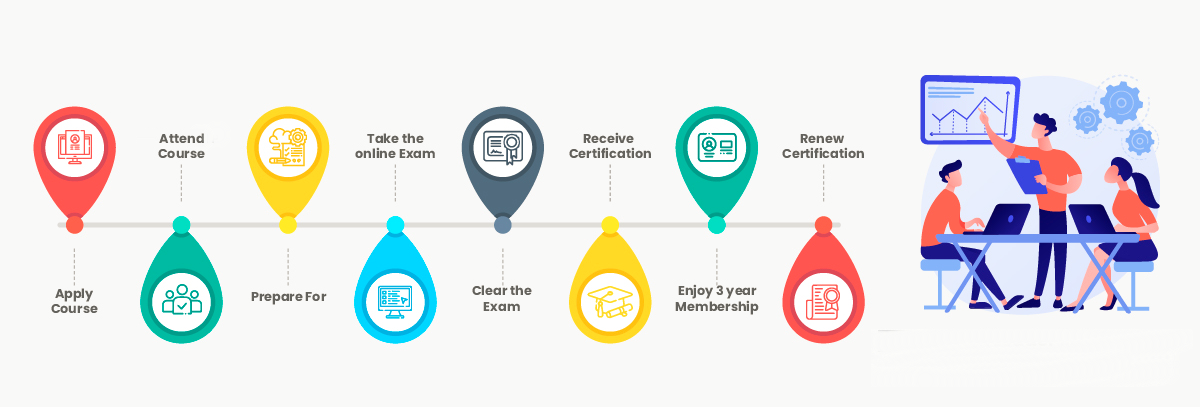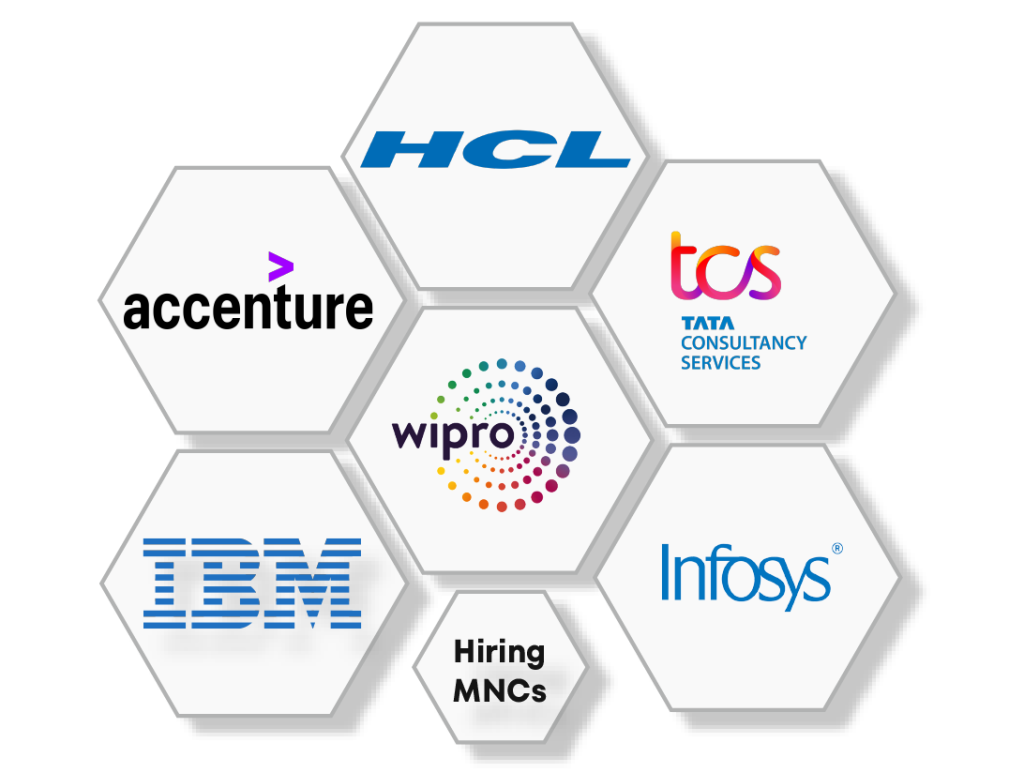
Sambodhi and Education Nest have designed an inclusive Six Sigma (Green Belt) training program that equips professionals with essential skills for efficient business management. Six Sigma focuses on reducing production variation and enhancing control, while Lean targets the elimination of non-value-adding processes and standardization to minimize waste. With the growing demand for Lean Six Sigma professionals due to the optimization benefits, this mid-level course serves as an ideal opportunity to develop a strong foundation in business management. Participants will master key concepts such as Fishbone/Ishikawa diagram, Root Cause analysis, Co-relation, Statistical analysis of data, and gain practical experience through industry-based use-cases and projects. Upon completion, individuals will become proficient Six Sigma Green Belt experts, empowering them to drive operational excellence within their organizations.
Application Deadline: Jun 30, 2023
Upskill for Your Dream Job
Sambodhi and Education Nest offers an exceptional Six Sigma (Green Belt) Training Course that equips participants with the knowledge and skills to excel in process improvement projects. With a focus on live project-based training, participants gain hands-on experience in applying Six Sigma methodologies to real-world scenarios. Led by experienced industry experts with over 10 years of expertise, our instructors have developed unique teaching styles to ensure effective learning and mastery of the subject. The course covers essential topics such as DMAIC (Define, Measure, Analyze, Improve, Control) methodology, statistical analysis, process mapping, and more. By completing the Six Sigma (Green Belt) Training Course, participants will possess the skills necessary to identify process inefficiencies, implement data-driven solutions, and contribute to organizational success through continuous improvement.



Instructor-led Six Sigma (Green Belt) live online Training Schedule
May 15th – Weekend
July 1st – Weekend
Why enroll for Six Sigma (Green Belt) Certificate Training Course?


According to a report by Grand View Research, the Six Sigma market was valued at USD 3.88 billion in 2020 and is expected to grow at a compound annual growth rate (CAGR) of 17.6% from 2021 to 2028.

Six Sigma (Green Belt) professionals are highly sought-after in industries and MNCs like GE, IBM, Amazon, Ford, P&G, and Toyota, who value their skills for process optimization and cost reduction.

On average, professionals with a Six Sigma (Green Belt) certification can expect a salary range of approximately USD 88,000 to USD 114,600.
Six Sigma (Green Belt) Training Course Benefits
The Six Sigma (Green Belt) training course offers numerous benefits for individuals seeking to enhance their careers in business management. Achieving a Lean Six Sigma Green Belt positions professionals as valuable assets to hiring organizations, as they possess the skills to significantly reduce or eliminate defective processes within the organization. By implementing the principles and tools of Six Sigma, organizations can experience improved financial profitability and overall performance. The ability to identify and address process inefficiencies and variations empowers Green Belt professionals to drive positive change, increase operational efficiency, and enhance customer satisfaction. The course equips individuals with the knowledge and techniques necessary to streamline processes, improve quality, and contribute to the success of their organizations.

Annual Salary

Hiring Companies
Want to become a Six Sigma (Green Belt) Professional.
Why Six Sigma (Green Belt) Certificate Training Course from Education Nest






Six Sigma (Green Belt) Skills Covered
Six Sigma (Green Belt) Training Course Syllabus
The Basics of Six Sigma
The Fundamentals of Six Sigma
Selecting Lean Six Sigma Projects
The Lean Enterprise
Process Definition
Six Sigma Statistics
Measurement System Analysis
Process Capability
Patterns of Variation
Inferential Statistics
Hypothesis Testing
Hypothesis Testing with Non-Normal Data
Simple Linear Regression
Multiple Regression Analysis
Lean Controls
Statistical Process Control (SPC)
Six Sigma Control Plans
The Basics of Six Sigma
The Fundamentals of Six Sigma
Selecting Lean Six Sigma Projects
The Lean Enterprise
Process Definition
Six Sigma Statistics
Measurement System Analysis
Process Capability
Patterns of Variation
Inferential Statistics
Hypothesis Testing
Hypothesis Testing with Non-Normal Data
Simple Linear Regression
Multiple Regression Analysis
Lean Controls
Statistical Process Control (SPC)
Six Sigma Control Plans
Six Sigma (Green Belt) Training Projects

In the retail industry, Six Sigma (Green Belt) projects play a vital role in driving operational efficiency and improving customer satisfaction. Retail organizations often face challenges such as inventory management, supply chain optimization, and process standardization. By applying Six Sigma methodologies, retail companies can identify and eliminate process inefficiencies, reduce defects, and enhance overall performance. Green Belt projects in the retail industry focus on areas such as reducing waste, improving product quality, streamlining order fulfillment processes, and enhancing customer service. The data-driven approach of Six Sigma enables retailers to make informed decisions, optimize operations, and deliver exceptional customer experiences, ultimately driving business growth and profitability in the competitive retail landscape.

In the IT industry, Six Sigma (Green Belt) projects play a significant role in improving operational efficiency and quality. By applying the principles of Six Sigma, IT organizations can streamline processes, reduce defects, and enhance customer satisfaction. These projects focus on identifying and eliminating wasteful activities, optimizing workflows, and improving the overall performance of IT systems and services. With the increasing complexity of IT processes and the need for high-quality deliverables, Six Sigma (Green Belt) projects provide a structured approach to problem-solving and data-driven decision-making. They enable IT teams to drive continuous improvement, increase productivity, and achieve cost savings, ultimately leading to improved project outcomes and greater success in the IT industry.
Six Sigma (Green Belt) Training Description
The Six Sigma (Green Belt) course provides comprehensive training in the principles and methodologies of Six Sigma, equipping participants with the knowledge and skills to contribute to process improvement projects. Through this course, participants learn essential concepts such as DMAIC (Define, Measure, Analyze, Improve, Control), statistical analysis, and process mapping. They gain practical insights into applying Six Sigma tools and techniques to identify and address process inefficiencies, reduce defects, and enhance overall quality. By completing the Six Sigma (Green Belt) course, participants acquire the expertise to drive continuous improvement initiatives, optimize business processes, and contribute to organizational success.
The objectives of the Six Sigma (Green Belt) course are as follows:
Learning the Six Sigma (Green Belt) course offers several benefits and reasons to consider:
Career Advancement: Six Sigma (Green Belt) certification enhances your professional profile, opening up new opportunities for career growth and advancement.
Process Improvement Skills: Develop valuable skills in process analysis, problem-solving, and data-driven decision-making, which are highly sought after in various industries.
Quality Management: Gain expertise in implementing quality management practices, ensuring that processes are optimized, defects are reduced, and customer satisfaction is improved.
Cost Reduction: Learn how to identify and eliminate waste, streamline processes, and improve efficiency, resulting in cost savings for organizations.
Business Performance Enhancement: Acquire the knowledge to drive continuous improvement initiatives, enhance productivity, and achieve operational excellence.
Problem-Solving Approach: Develop a structured problem-solving approach that utilizes data and statistical tools to identify root causes and implement effective solutions.
Project Leadership: Learn to lead and contribute effectively to Six Sigma projects, working collaboratively with cross-functional teams to achieve project goals.
Competitive Advantage: Gain a competitive edge in the job market by possessing a widely recognized and valued certification in process improvement.
Organizational Impact: Make a significant impact on your organization by driving process improvements, enhancing customer satisfaction, and achieving measurable results.
Personal Development: Enhance your analytical, critical thinking, and project management skills, which are transferrable to various roles and industries.
The Lean Six Sigma Green Belt Training is designed for professionals and students who want to develop the lead process improvement initiatives. The following are the professionals who are recommended to take this course:
The prerequisites for the Six Sigma (Green Belt) course are as follows:
Basic Knowledge of Statistics: A foundational understanding of statistical concepts and data analysis techniques is beneficial for comprehending Six Sigma methodologies.
Fundamental Math Skills: Proficiency in basic mathematics, including arithmetic, algebra, and geometry, is essential for performing calculations and interpreting data.
Familiarity with Excel: Having basic knowledge of Microsoft Excel is recommended, as it is often used for data analysis and statistical calculations in Six Sigma projects.
Work Experience: While not mandatory, having practical work experience in a professional environment can provide context and relevance to the concepts taught in the course.
Motivation and Commitment: A strong desire to learn and apply Six Sigma principles, as well as the commitment to actively participate in the course and complete assignments, is important for success.
Sambodhi and Education Nest offer a range of Project Management courses to cater to different needs and skill levels. In addition to the Six Sigma (Green Belt) course, they provide the following courses:
Project Management Professional (PMP): This course is designed for experienced project managers who want to obtain the globally recognized PMP certification. It covers the complete project management lifecycle, including initiating, planning, executing, monitoring, controlling, and closing projects.
Project Risk Management: This course delves into the various aspects of project risk management, including risk identification, assessment, mitigation, and monitoring. Participants learn how to effectively manage risks to ensure project success.
Program Management Professional (PgMP): The PgMP course focuses on advanced program management principles, providing professionals with the knowledge and techniques required to manage complex programs and achieve strategic business objectives.
Agile Project Management: This course focuses on Agile project management methodologies, such as Scrum, Kanban, and Lean. Participants learn how to apply Agile principles and practices to enhance project delivery and adapt to changing requirements.
PRINCE2: PRojects IN Controlled Environments 2 (PRINCE2) is a widely used project management methodology. This course equips participants with the knowledge and skills to effectively implement PRINCE2 principles and practices in managing projects.
Primavera P6: This course focuses on Primavera P6, a leading project management software widely used in industries like construction, engineering, and manufacturing. Participants learn how to plan, manage, and control projects using Primavera P6.
These courses offer valuable knowledge and skills for professionals seeking to enhance their project management capabilities and achieve success in their projects.
The Six Sigma (Green Belt) course provides comprehensive training in the principles and methodologies of Six Sigma, equipping participants with the knowledge and skills to contribute to process improvement projects. Through this course, participants learn essential concepts such as DMAIC (Define, Measure, Analyze, Improve, Control), statistical analysis, and process mapping. They gain practical insights into applying Six Sigma tools and techniques to identify and address process inefficiencies, reduce defects, and enhance overall quality. By completing the Six Sigma (Green Belt) course, participants acquire the expertise to drive continuous improvement initiatives, optimize business processes, and contribute to organizational success.
The objectives of the Six Sigma (Green Belt) course are as follows:
Learning the Six Sigma (Green Belt) course offers several benefits and reasons to consider:
Career Advancement: Six Sigma (Green Belt) certification enhances your professional profile, opening up new opportunities for career growth and advancement.
Process Improvement Skills: Develop valuable skills in process analysis, problem-solving, and data-driven decision-making, which are highly sought after in various industries.
Quality Management: Gain expertise in implementing quality management practices, ensuring that processes are optimized, defects are reduced, and customer satisfaction is improved.
Cost Reduction: Learn how to identify and eliminate waste, streamline processes, and improve efficiency, resulting in cost savings for organizations.
Business Performance Enhancement: Acquire the knowledge to drive continuous improvement initiatives, enhance productivity, and achieve operational excellence.
Problem-Solving Approach: Develop a structured problem-solving approach that utilizes data and statistical tools to identify root causes and implement effective solutions.
Project Leadership: Learn to lead and contribute effectively to Six Sigma projects, working collaboratively with cross-functional teams to achieve project goals.
Competitive Advantage: Gain a competitive edge in the job market by possessing a widely recognized and valued certification in process improvement.
Organizational Impact: Make a significant impact on your organization by driving process improvements, enhancing customer satisfaction, and achieving measurable results.
Personal Development: Enhance your analytical, critical thinking, and project management skills, which are transferrable to various roles and industries.
The Lean Six Sigma Green Belt Training is designed for professionals and students who want to develop the lead process improvement initiatives. The following are the professionals who are recommended to take this course:
The prerequisites for the Six Sigma (Green Belt) course are as follows:
Basic Knowledge of Statistics: A foundational understanding of statistical concepts and data analysis techniques is beneficial for comprehending Six Sigma methodologies.
Fundamental Math Skills: Proficiency in basic mathematics, including arithmetic, algebra, and geometry, is essential for performing calculations and interpreting data.
Familiarity with Excel: Having basic knowledge of Microsoft Excel is recommended, as it is often used for data analysis and statistical calculations in Six Sigma projects.
Work Experience: While not mandatory, having practical work experience in a professional environment can provide context and relevance to the concepts taught in the course.
Motivation and Commitment: A strong desire to learn and apply Six Sigma principles, as well as the commitment to actively participate in the course and complete assignments, is important for success.
Sambodhi and Education Nest offer a range of Project Management courses to cater to different needs and skill levels. In addition to the Six Sigma (Green Belt) course, they provide the following courses:
Project Management Professional (PMP): This course is designed for experienced project managers who want to obtain the globally recognized PMP certification. It covers the complete project management lifecycle, including initiating, planning, executing, monitoring, controlling, and closing projects.
Project Risk Management: This course delves into the various aspects of project risk management, including risk identification, assessment, mitigation, and monitoring. Participants learn how to effectively manage risks to ensure project success.
Program Management Professional (PgMP): The PgMP course focuses on advanced program management principles, providing professionals with the knowledge and techniques required to manage complex programs and achieve strategic business objectives.
Agile Project Management: This course focuses on Agile project management methodologies, such as Scrum, Kanban, and Lean. Participants learn how to apply Agile principles and practices to enhance project delivery and adapt to changing requirements.
PRINCE2: PRojects IN Controlled Environments 2 (PRINCE2) is a widely used project management methodology. This course equips participants with the knowledge and skills to effectively implement PRINCE2 principles and practices in managing projects.
Primavera P6: This course focuses on Primavera P6, a leading project management software widely used in industries like construction, engineering, and manufacturing. Participants learn how to plan, manage, and control projects using Primavera P6.
These courses offer valuable knowledge and skills for professionals seeking to enhance their project management capabilities and achieve success in their projects.
Six Sigma (Green Belt) Training Course reviews
Read learner testimonials
Vivan D.
I am extremely pleased with the Six Sigma (Green Belt) course offered by Sambodhi and Education Nest. The course content is exceptional, reflecting the latest industry standards. The support team was highly responsive, promptly addressing all my queries and concerns. It was truly satisfying to receive immediate assistance. The instructor's experience was evident, and the content was of high quality. The classes were well-organized and interactive, making the learning experience enjoyable and effective. I highly recommend Sambodhi and Education Nest for their excellent Six Sigma (Green Belt) course.
Rameshwar O.
I had completed the Six Sigma (Green Belt) Course in Sambodhi and Education Nest Team. I am extremely impressed with the 24x7 support provided by Sambodhi and Education Nest for the course. Their prompt assistance and guidance have been invaluable throughout my learning journey. Thank you so much!
Ashish M.
I am thrilled to say that the program was a complete success, and the training provided was truly outstanding. The instructor's enthusiasm and expertise made it easy for all of us to grasp and absorb the concepts. The course was conducted and delivered in a well-organized manner. Overall, it was an exceptional experience.
Hear from our learners
Lorem ipsum dolor sit amet, consectetur adipiscing elit. Ut elit tellus, luctus nec ullamcorper mattis, pulvinar dapibus leo.
Lorem ipsum dolor sit amet, consectetur adipiscing elit. Ut elit tellus, luctus nec ullamcorper mattis, pulvinar dapibus leo.
Lorem ipsum dolor sit amet, consectetur adipiscing elit. Ut elit tellus, luctus nec ullamcorper mattis, pulvinar dapibus leo.
Like what you hear from our learners?
Creating Epic Presentations: Communicating Powerful Ideas reviews
Six Sigma (Green Belt) Training FAQs
If you miss an online Six Sigma (Green Belt) Training class, it’s important to reach out to the instructor or the support team of the online training platform you are using. They may be able to provide you with a recording or transcript of the missed class, so that you can catch up on what you missed. Alternatively, some platforms offer on-demand access to class materials, so you can go back and review the content on your own time. It’s always a good idea to try and make up the missed material as soon as possible, so that you don’t fall behind in your learning.
If you have queries after completing an online Six Sigma (Green Belt) Training course, Education Nest training platforms offer some form of post-course support. This may include access to a dedicated support team, a community forum where you can ask questions and connect with other learners, or even one-on-one sessions with an instructor or coach. If you have specific questions or concerns related to the course material, you can reach out to the instructor directly or use the support channels provided by the platform. It’s always a good idea to clarify any doubts or questions you may have, as this will help to solidify your understanding of the material and ensure that you can apply what you’ve learned in a real-world context.
Six Sigma (Green Belt) is a methodology and a level of certification within the field of quality management and process improvement. It is focused on identifying and eliminating defects, minimizing process variation, and improving overall organizational performance. The Green Belt level is typically associated with professionals who play a key role in Six Sigma projects, assisting in data collection and analysis, participating in problem-solving efforts, and implementing process improvements. Green Belt practitioners possess a solid understanding of Six Sigma tools, techniques, and methodologies and can contribute effectively to continuous improvement initiatives. They work under the guidance of Black Belts and collaborate with cross-functional teams to achieve project goals and drive organizational excellence.
The timing of when you get access to learning content after signing up for an online Six Sigma (Green Belt) Training course will depend on the specific training platform you are using. In most cases, you should receive access to the learning content immediately upon signing up, or shortly after your payment has been processed. Some platforms may require you to complete an enrolment process or set up an account before you can access the content. It’s always a good idea to check the specific details of the course or platform you are using, as the timing and process may vary. If you are experiencing any issues accessing the learning content, you should contact the support team of the training platform for assistance.
Once you enrol in Six Sigma (Green Belt) Training course, you will typically have access to the course material for as long as the course remains available on the platform. This means that you can revisit the material at any time, even after you have completed the course, and continue to learn and improve your skills. The benefit of lifetime access to the learning material is that it allows you to learn at your own pace and on your own schedule. You can review the content as many times as you need to fully understand the concepts and techniques covered in the course. Additionally, if you encounter a new challenge in your work or personal life, you can go back to the course material to find solutions and strategies to help you overcome the challenge. Having access to course material for a lifetime is a valuable benefit, as it allows you to continue to improve your skills and knowledge long after you have completed the course. So, if you are interested in improving your Communication skill, build confidence and want the flexibility to learn at your own pace, consider enrolling in Six Sigma (Green Belt) Training course that offers lifetime access to the learning material.
If you miss an online Six Sigma (Green Belt) Training class, it’s important to reach out to the instructor or the support team of the online training platform you are using. They may be able to provide you with a recording or transcript of the missed class, so that you can catch up on what you missed. Alternatively, some platforms offer on-demand access to class materials, so you can go back and review the content on your own time. It’s always a good idea to try and make up the missed material as soon as possible, so that you don’t fall behind in your learning.
If you have queries after completing an online Six Sigma (Green Belt) Training course, Education Nest training platforms offer some form of post-course support. This may include access to a dedicated support team, a community forum where you can ask questions and connect with other learners, or even one-on-one sessions with an instructor or coach. If you have specific questions or concerns related to the course material, you can reach out to the instructor directly or use the support channels provided by the platform. It’s always a good idea to clarify any doubts or questions you may have, as this will help to solidify your understanding of the material and ensure that you can apply what you’ve learned in a real-world context.
Six Sigma (Green Belt) is a methodology and a level of certification within the field of quality management and process improvement. It is focused on identifying and eliminating defects, minimizing process variation, and improving overall organizational performance. The Green Belt level is typically associated with professionals who play a key role in Six Sigma projects, assisting in data collection and analysis, participating in problem-solving efforts, and implementing process improvements. Green Belt practitioners possess a solid understanding of Six Sigma tools, techniques, and methodologies and can contribute effectively to continuous improvement initiatives. They work under the guidance of Black Belts and collaborate with cross-functional teams to achieve project goals and drive organizational excellence.
The timing of when you get access to learning content after signing up for an online Six Sigma (Green Belt) Training course will depend on the specific training platform you are using. In most cases, you should receive access to the learning content immediately upon signing up, or shortly after your payment has been processed. Some platforms may require you to complete an enrolment process or set up an account before you can access the content. It’s always a good idea to check the specific details of the course or platform you are using, as the timing and process may vary. If you are experiencing any issues accessing the learning content, you should contact the support team of the training platform for assistance.
Once you enrol in Six Sigma (Green Belt) Training course, you will typically have access to the course material for as long as the course remains available on the platform. This means that you can revisit the material at any time, even after you have completed the course, and continue to learn and improve your skills. The benefit of lifetime access to the learning material is that it allows you to learn at your own pace and on your own schedule. You can review the content as many times as you need to fully understand the concepts and techniques covered in the course. Additionally, if you encounter a new challenge in your work or personal life, you can go back to the course material to find solutions and strategies to help you overcome the challenge. Having access to course material for a lifetime is a valuable benefit, as it allows you to continue to improve your skills and knowledge long after you have completed the course. So, if you are interested in improving your Communication skill, build confidence and want the flexibility to learn at your own pace, consider enrolling in Six Sigma (Green Belt) Training course that offers lifetime access to the learning material.
Be future ready, start learning